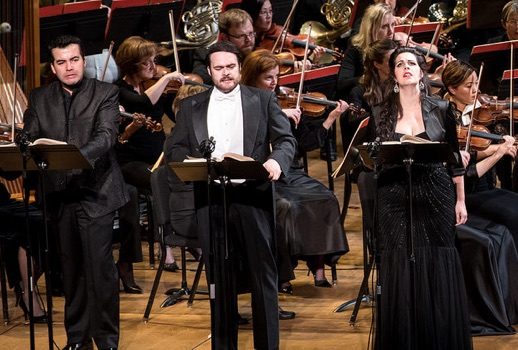
Women seem wicked when you’re unwanted
I can’t lie: when I saw that Washington Concert Opera announced an all-Bel Canto 2017-2018 season, I felt a little stalked by the spectre of Will Crutchfield’s Bel Canto at Caramoor presentations, to which I’ve enjoyed a close proximity.
What distinguished Crutchfield’s program was his commitment to making the case that each work revived was a valuable, viable dramatic work in its own way. Sometimes it made sense and was effective theatre (La Favorite), sometimes it didn’t and there was just pretty music (Aureliano in Palmira).
That’s not to ascribe motives to WCO for their fall foray into neglected Bel Canto, Vincenzo Bellini’s La Straniera, presented at George Washington University’s dreary Lisner Hall on Sunday. But with a confusing plot and singers that lacked much innate flair for the material, not much of a case was made for anything.
Like many un- or under-performed Bel Canto operas, Straniera was a huge hit when it premiered in Milan in 1829. With a cast lead by Henriette Méric-Lalande, the first Imogene in Il Pirata and Lucrezia Borgia in Donizetti’s opera of the same name, it was the singing that made the greatest impression after the premiere and the piece has since been occasionally snapped up by sopranos looking to shake, warble, and roll while doing their best “baleful.”
The plot centers around an aloof Straniera (yes, they all refer to her as that) called Alaide living in seclusion at the edge of lake who is being fiercely pursued by Arturo. Arturo, in turn, is betrothed to Isoletta, daughter of Count Montolino. But Arturo isn’t interested and gets his hands dirty with the blood of Valdeburgo, Alaide’s brother, in his pursuit. Alaide gets raked over the coals by a mob of angry peasants for being so tragically beautiful as to allow this all to happen.
Then, when Arturo finally resigns himself to life with Isoletta, the news breaks that Queen Isemberga, Alaide’s rival, has died and that she can return from exile to her rightful position as consort to the king of France. Also her name is actually Agnes. One (or both) of these revelations is so upsetting to Arturo that he offs himself on his wedding day and the angry peasants resume their assumption that beautiful, unmarried women are of the devil.
If it sounds like an edge-of-your-seat afternoon of international intrigue set to Felice Romani’s libretto, it’s not – it’s dramatically lumpy and the longeurs come in all the predictable places. But it’s still a vehicle for a soprano with a good smoky eye and Alaide has some wonderful opportunities to own her outcast status through florid singing and melodic declamation.
It’s too bad Amanda Woodbury, feeling slightly under the weather, as was announced, in her Concert Opera debut, didn’t seem to approach it this way. Known (or unknown) to New York audiences as Diana Damrau’s cover in Pècheurs des Perles and Roméo et Juliette, Woodbury’s voice is a pleasant melding of a chocolatey lower register with an indistinct middle and some attractive (if tenuous, as heard on Sunday) high notes.
But like many of Bellini’s heroines, the role’s tessitura isn’t terribly high, with lots of opportunities for interpolation. What’s needed is a solid vocal core and the temperament to put the story over the edge, and Woodbury didn’t have much of either. She sang all the notes, hit the marks in the runs and trills, and even built a compelling final scena in “Sono all’ara,” but lacked authority with the material across the evening. This Straniera seemed but incidental to the opera that bears her name (or one of her names, at least).
All the authority Woodbury lacked with the material, though, tenor Gerard Schneider seemed eager to make up for. Charging and careening his way through Bellini’s music with the delicacy of a bull in a china shop, Schneider made some pleasant sounds but did nothing to string them together.
Existing in disparate chunks across the range, from worn at the bottom to gleaming with golden resonance in the top’s punched-out high notes, his voice lacks any unifying qualities and exaggerated physical mannerisms make it no wonder why he’s better suited to the mercurial verismo roles he’s performed to such exposure (he was Dmitri in Alfano’s Risurezzione at Wexford just last month). It was a wonder why the Isoletta, sung with refreshing naturalness and a soft-grained, luminous mezzo by Corrie Stallings, was so broken up over the whole thing.
As Valdeburgo, baritone Javier Arrey’s battled between awkward, crooned restraint and sonorous declamation, but his dramatic instincts weren’t nearly as contrived. Bass-baritone Matthew Scollin and tenor Jonas Hacker were consistently firm-toned throughout the evening and bass Timothy Bruno brought much-needed gravitas and authority to his singing as Il Priore.
Maestro Anthony Walker seemed a little more at sea when it came to mining any human drama from the score, and widely-varying tempi came as a result, though he did draw nice playing from the Washington Concert Opera Orchestra. And though the chorus sounded remarkably cohesive (and surprisingly quiet for such a robust group) for less than a week of rehearsal, as is WCO’s custom, they could have benefitted from a lot more diction coaching.
Washington Concert Opera returns in February with a pair of Costa-Jackson sisters in Donizetti’s Maria di Rohan. Here’s hoping that that a new set of singers help Bel Canto in DC find its steely core by then.
Photo: Don Lassell



